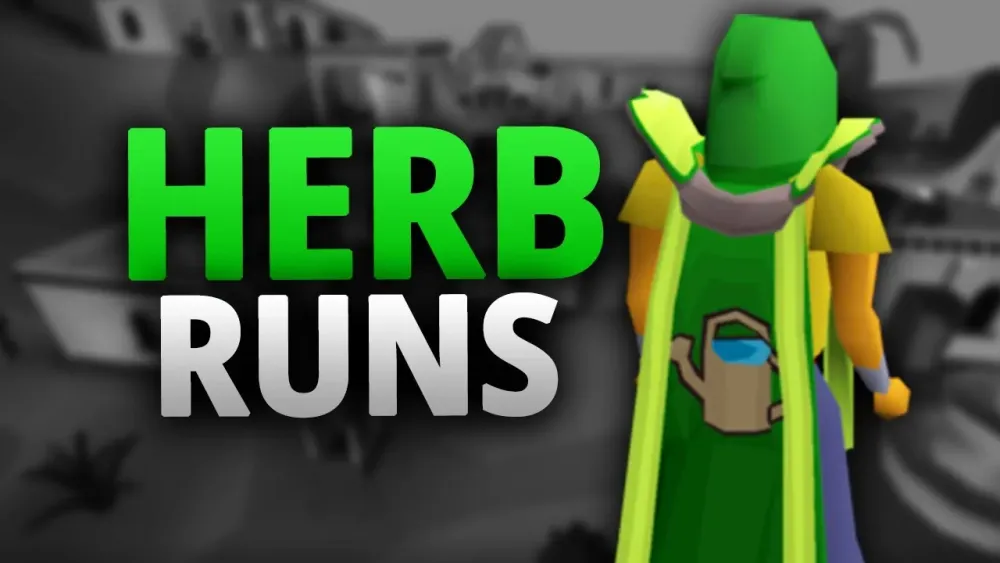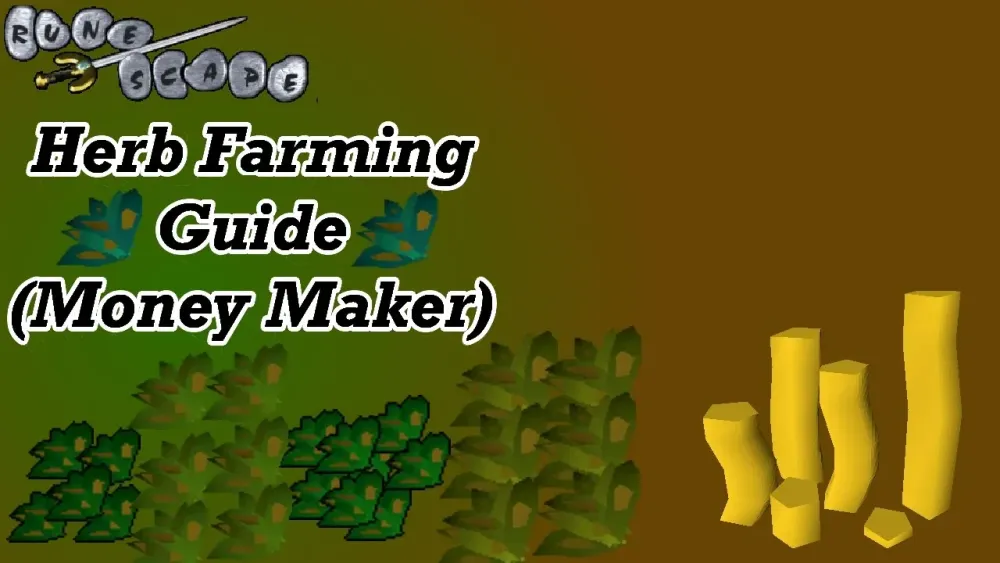Your cart is empty
Maximizing Herb Farming Profits in OSRS

Warning: Undefined variable $post in /home/osrsmoneymaking.guide/public_html/wp-content/themes/kadence/functions.php on line 391
Warning: Attempt to read property "ID" on null in /home/osrsmoneymaking.guide/public_html/wp-content/themes/kadence/functions.php on line 391
Herb farming in Old School RuneScape (OSRS) is a lucrative activity that can significantly boost a player’s in-game wealth. By cultivating various herbs, players can craft potions, contribute to their skills, and sell excess herbs for profit. Understanding the nuances of herb farming, including the best practices and strategies, can lead to maximized returns. This guide will help you navigate the essential aspects of herb farming, ensuring you make the most out of your time and resources in the game.
Selecting the appropriate herbs is crucial for maximizing profits in herb farming. The profitability of herbs can fluctuate based on market demand, your farming level, and the availability of resources. Here are some key herbs to consider:
- Ranarr Weed: This herb is highly sought after for its use in making prayer potions. With a relatively high selling price and consistent demand, it is an excellent choice for profit. It requires level 19 Farming to grow and can be harvested every 75 minutes.
- Snapdragon: Another profitable herb, Snapdragons are used to create Super restore potions. They require level 65 Farming and yield a good profit margin, making them a popular choice among players. Harvesting takes place every 80 minutes.
- Torstol: As one of the highest-level herbs, Torstols are essential for high-end potions like Saradomin brews. They require level 85 Farming to cultivate and can yield significant profits due to their rarity and demand.
- Grimy Herbs: While not as profitable as their clean counterparts, grimy herbs can still provide a decent income, especially if you’re looking to sell to players who need them for training Herblore. Be cautious of the cleaning process, as it consumes time and resources.
In addition to choosing the right herbs, consider the following strategies:
- Monitor Market Prices: Check the Grand Exchange regularly to gauge the current market prices for different herbs. Fluctuations can vary based on updates and player activities, so staying informed is key.
- Utilize Herb Boxes: If you have access to the Farming Guild, using herb boxes can help increase your yield and save inventory space.
- Combine with Other Skills: Pair herb farming with skills like Herblore and Prayer to create potions that can be used or sold for additional profit.
By carefully selecting herbs and implementing these strategies, you can significantly enhance your herb farming profits in OSRS, ensuring a fruitful and rewarding experience in the game.
Essential Farming Equipment and Tools

When it comes to herb farming in Old School RuneScape (OSRS), having the right equipment and tools can significantly boost your efficiency and profits. Here’s a rundown of the essentials you’ll want to have in your inventory:
- Seed Dibber: This handy tool is crucial for planting your herb seeds. Without it, you won’t be able to sow your crops at all!
- Trowel: While not always necessary, a trowel can be useful for removing weeds and maintaining your herb patches.
- Watering Can: Keeping your herbs hydrated is key to maximizing your yield. Use a watering can to ensure your plants thrive.
- Super compost: This is a game changer! Using super compost in your patches can significantly increase your yield and reduce the chance of disease.
- Herb Sack: If you want to save inventory space and make your herb farming trips more efficient, consider acquiring a herb sack. It allows you to store multiple types of herbs without cluttering your inventory.
- Spade: While not always necessary for herb farming, a spade can help you clear out any unwanted plants or weeds that may hinder your crops.
Investing in these essential tools will not only streamline your herb farming process but also ensure that you’re maximizing your output and profits. Always keep your equipment in good condition to avoid any hiccups while farming!
Best Locations for Herb Farming
Choosing the right location for herb farming in OSRS can make a world of difference in your profits. Here are some of the best spots to consider:
| Location | Notes |
|---|---|
| Falador | Located near the south-east of Falador, this patch is easily accessible and close to a bank. |
| Ardougne | The herb patch in Ardougne is excellent due to its proximity to the bank and the farming guild. |
| Hosidius | Located in the Hosidius region, this patch can benefit from the use of super compost for increased yields. |
| Weiss | This patch is a bit further but offers a great variety of herbs and is close to the bank. |
| Farming Guild | The Farming Guild has multiple herb patches and is ideal for those looking to farm multiple types of herbs efficiently. |
By selecting these prime locations, you can maximize your herb farming output and profitability. Make sure to take into account the distance to banks and other resources to streamline your farming trips effectively!
Strategies for Efficient Herb Farming
Herb farming in Old School RuneScape (OSRS) can be a lucrative endeavor if approached with the right strategies. Here are some effective techniques to maximize your herb yields and profits:
- Choose the Right Herbs: Focus on farming herbs that are in high demand. Some popular choices include Snapdragon, Torstol, and Ranarr weed. Research current market prices to ensure you’re planting the most profitable varieties.
- Utilize Farming Contracts: Completing farming contracts from the Guildmaster in the Farming Guild can provide you with valuable rewards and help you specialize in specific herbs.
- Plan Your Farming Routes: Efficiently route your herb patches to minimize travel time. A popular route includes the patches at Falador, Ardougne, and Harralander. Use teleport spells and items to speed up your journey.
- Use Supercompost: Enhance your patch yields by using supercompost. This not only increases the number of herbs you harvest but also reduces the chance of disease.
- Check for Disease: Regularly monitor your herb patches for disease. Use a plant cure or check the patch health frequently to ensure you don’t lose any valuable crops.
- Participate in Events: Keep an eye out for in-game events or updates that may affect herb farming or boost demand for specific herbs.
By implementing these strategies, you can significantly improve your herb farming efficiency and maximize your profits in OSRS.
Market Trends: Selling Your Herbs for Maximum Profit
Understanding market trends is crucial for selling your herbs effectively and maximizing your profits in OSRS. Here are some tips to navigate the herb market:
- Monitor Prices: Regularly check the Grand Exchange for current herb prices. Websites and tools like GE Tracker can provide historical price data and trends, helping you make informed selling decisions.
- Timing Matters: Sell your herbs at peak times when demand is high. Consider timing your sales around updates or events that increase potion-making, as this will drive up the need for herbs.
- Group Herbs: Instead of selling herbs individually, consider selling them in bundles. This can attract buyers looking to purchase larger quantities at once, potentially resulting in higher overall profits.
- Be Aware of Fluctuations: Prices can fluctuate significantly based on supply and demand. Stay informed about any game updates or meta changes that might impact the desirability of certain herbs.
- Use Different Selling Channels: Besides the Grand Exchange, consider using player-to-player trading or forums to sell your herbs. Some players may pay a premium for specific herbs.
By keeping a close eye on market trends and adapting your selling strategy accordingly, you can ensure that you’re getting the best possible price for your herbs, ultimately maximizing your farming profits in OSRS.
Common Mistakes to Avoid in Herb Farming
Herb farming in OSRS can be a lucrative venture, but it’s easy to trip up, especially if you’re new to the game. Avoiding common mistakes is key to maximizing your profits. Here’s a rundown of what to watch out for:
- Neglecting Watering: Always remember to water your herbs! Forgetting this simple step can lead to stunted growth or even total crop failure.
- Ignoring Weeding: Weeds can overtake your herb patches if you leave them unattended. Make it a habit to check your patches regularly and remove any weeds you find.
- Not Using Super Compost: Using regular compost might save you a few coins, but super compost significantly boosts your yield and protects against disease. It’s worth the investment!
- Overlooking Patch Locations: Different herbs thrive better in specific locations. Make sure you’re planting the right herbs in the right patches.
- Failing to Check the Market: The prices of herbs fluctuate, so keep an eye on the Grand Exchange. Selling at the right time can make a huge difference in your profits.
Avoid these pitfalls, and you’ll find that your herb farming endeavors are far more rewarding!
Advanced Tips for Seasoned Farmers
If you’re already familiar with the basics of herb farming in OSRS and are looking to take your skills to the next level, here are some advanced tips to maximize your profits:
- Utilize the Farming Guild: Joining the Farming Guild gives you access to exclusive perks, including higher yields and lower disease rates.
- Hybrid Farming: Combine herb farming with other crops like trees or flowers in your patches to diversify your income streams.
- Use Teleports Wisely: Save time by using teleports to get to your herb patches quickly. Every second counts when managing multiple patches!
- Crop Rotation: Rotate your herbs to maintain soil quality and prevent depletion of nutrients. This can lead to better yields in the long run.
- Participate in Events: Keep an eye on in-game events that might boost herb yields or prices. Timing your farming around these events can lead to higher profits.
By implementing these advanced strategies, you’ll not only increase your herb farming efficiency but also see a noticeable boost in your overall profits!
Maximizing Herb Farming Profits in OSRS
Herb farming in Old School RuneScape (OSRS) is an essential skill for players looking to boost their profits and supply their potion-making endeavors. To maximize your herb farming profits, consider the following strategies:
- Choose the Right Herbs: Some herbs have higher market values than others. Focus on growing herbs like:
- Ranarr Weed
- Torstol
- Snapdragon
- Catantine
- Utilize Farming Contracts: Engage in farming contracts from the Farming Guild for additional rewards and the chance to grow specific herbs for profit.
- Use the Right Tools: Equip magic secateurs to increase your yield by 10% and plant super compost to further enhance growth rates.
- Plan Your Farming Runs: Create an efficient route for your herb runs, incorporating teleportation methods like the Lunar Spellbook for quick access to herb patches.
Herb Farming Locations
| Location | Herbs | Access Method |
|---|---|---|
| Farming Guild | All herbs | Teleport to Farming Guild |
| Falador | All herbs | Teleport to Falador |
| Taverley | All herbs | Teleport to Taverley |
By implementing these strategies and focusing on high-value herbs, players can significantly increase their herb farming profits in OSRS. Consistent practice and optimal planning are key to success in this rewarding activity.
Conclusion: Making the most of your herb farming experience in OSRS involves strategic planning, efficient routes, and a focus on high-value crops, ensuring that your efforts translate into substantial profits.
Warning: Undefined variable $post in /home/osrsmoneymaking.guide/public_html/wp-content/themes/kadence/functions.php on line 391
Warning: Attempt to read property "ID" on null in /home/osrsmoneymaking.guide/public_html/wp-content/themes/kadence/functions.php on line 391

